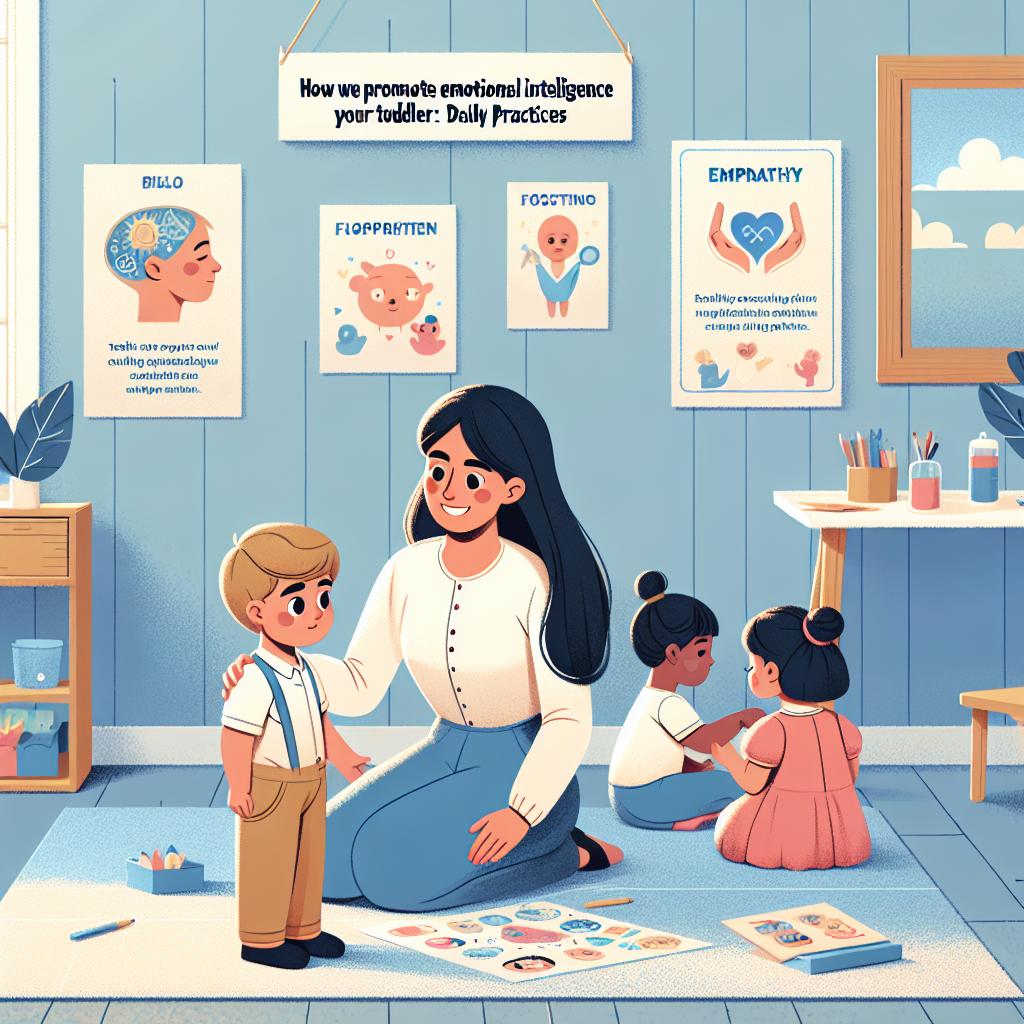How We Foster Empathy and Positive Behavior in Our Toddler
As parents, we strive to raise well-rounded children who are not only smart but also emotionally intelligent. A child’s emotional intelligence plays a significant role in their social interactions, personal growth, and overall happiness. It is crucial to start teaching emotional intelligence early and make it a consistent part of their upbringing. Let’s delve into how we promote emotional intelligence in our toddler.
Fostering Empathy
Educating your child about empathy is an effective way to set a strong emotional intelligence foundation. It enables them to understand and share the feelings of others, promoting compassion and kindness. Studies have shown that empathy can be fostered through regular engagement and interactions.
- Modeling: Children often learn by observation. Let your toddler see you express empathy towards others. Show them how to respond compassionately to different situations.
- Mood Awareness: Teach your toddler to identify their feelings and those of others. Make it a habit to ask them how they feel about different things and why.
- Role-Playing: This fun toddler activity can be a great tool for teaching empathy. Role-play different scenarios where they can practice empathic responses.
We have also found that encouraging language development can be very beneficial for fostering empathy. This is because language significantly aids in expressing and understanding feelings. Take a look at some of these fun activities that helped our baby talk and may also help your toddler.
Promoting Positive Behavior
Promoting positive behavior in your toddler can greatly contribute to their emotional intelligence. It involves guiding them to make good choices and behave well towards others. Research shows that positive behavior has significant long-term benefits on a child’s success and wellbeing.
- Positive Reinforcement: Celebrate your toddler’s good behavior to motivate them to keep doing well. Our first Christmas celebration is an example of how we used positive reinforcement in a fun and loving way.
- Consistent Structure: Consistent routines and rules can help toddlers understand what is expected of them, leading to better behavior.
- Conflict Resolution: Teach them how to resolve conflicts in a calm and fair manner. Encourage problem-solving skills and negotiation rather than aggressive behavior.
Remember, toddlers learn best in safe and fun environments. By babyproofing your living room, you can create a positive space for your toddler to learn and grow. Check out our tips for creating a safe and fun environment at home.
The Role of Daily Practices in Teaching Emotional Intelligence
Implementing daily practices is key to successfully teaching emotional intelligence. Don’t worry if you don’t see immediate results – it’s about fostering emotional growth over time. Patience and consistency are key, and every child progresses at their own pace. As a parent, your role is to provide guidance and nurturing to help them along the way.
Your journey to teaching emotional intelligence is unique, and every child is different. The practices we’ve shared have worked well for our family, but feel free to adapt them to your child’s needs and personality. Remember, it is as much a learning process for you as it is for your toddler. Enjoy the journey!
Strategies for Building Emotional Intelligence in Toddlers
Integrating emotional intelligence building activities in your child’s day-to-day routine can help gradually develop skills like empathy, understanding emotions, and building relationships. Below are specific methods we use to incorporate these valuable lessons.
- Emotion Dress-up: We use puppets, dolls, and other toys that our toddler connects with to act out various scenarios that involve different feelings. This provides an opportunity for our toddler to identify and understand different emotions.
- Emotional Storytelling: We include stories and books that highlight different emotions and feelings in our toddler’s reading routine. It’s a great way to help them understand different feelings better and build empathy.
- Emotional Intelligence Games: Emotional intelligence can be taught using fun and engaging games that help kids recognize and identify emotions. There are tons of helpful games and activities to ramp up your child’s emotional intelligence.
Parenting Style and Encouragement of Emotional Intelligence
Patience, understanding, and promoting positive attitudes are critical components of how we parent. Here are some ways we help foster emotional intelligence through our parenting style.
- Sympathetic Listening: We make a concerted effort to listen to our toddler, validate their feelings, and encourage them to share their emotions. We encourage them to vocalize their feelings and strive to understand them. This provides a safe space where open communication and emotional expression are promoted.
- Practicing Emotional Vocabulary: Encouraging our toddler to express their feelings using words not only helps in communication but also helps them understand their emotions. We regularly introduce new emotional vocabulary to provide them with a better vocabulary to express their feelings.
- Emotion Regulation Coaching: It is essential to help toddlers manage their emotions constructively, especially when they’re overwhelmed. We have conducted a few activities that help them develop emotional regulation and control which can be easily adapted to your needs.
Behavior Management and Emotional Intelligence
Proactive behavior management is another critical aspect in shaping a child’s emotional intelligence. Discipline should be educational rather than punitive. Here’s how we tackle behavior management to promote emotional intelligence.
- Choice and Responsibility: Giving our toddler the chance to make decisions fosters a sense of responsibility and encourages them to think about the consequences of their actions.
- Problem Solving Approach: We promote a problem-solving approach to conflicts. This teaches our toddler the importance of empathy, negotiation, and how to resolve issues amicably.
- Modeling Good Behavior: Children learn from their environment, parents, and caregivers. We strive to model tolerance, respect, and understanding, which our toddler can mirror in their interactions.
Boosting a toddler’s emotional intelligence is essential as it impacts their future social skills and overall well-being. While our journey is an ongoing one, we hope our insights help you guide your toddler towards building robust emotional intelligence. Happy parenting!

